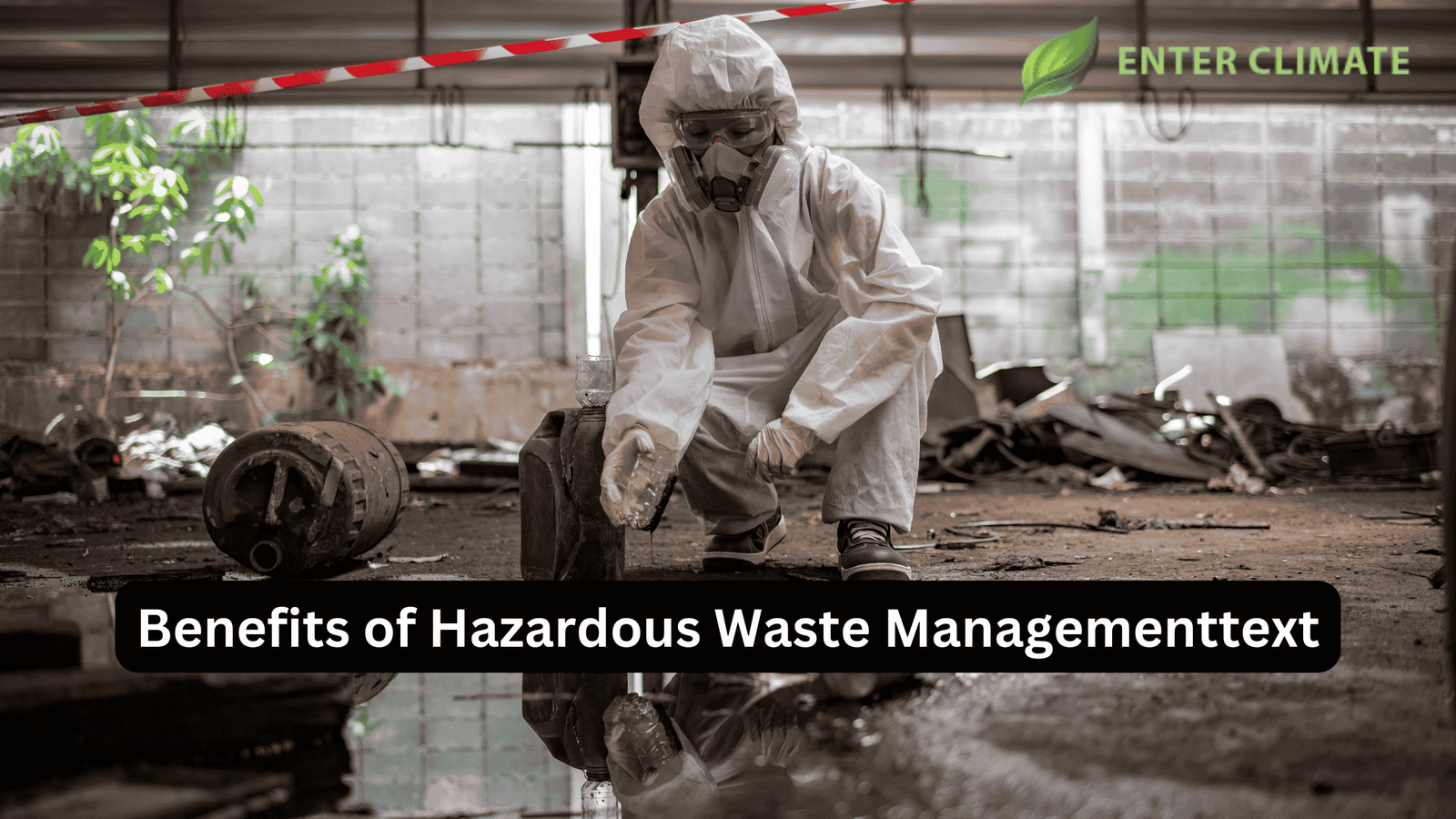Hazardous waste management is a critical aspect of environmental stewardship, workplace safety, and regulatory compliance. Whether you are part of a manufacturing company, a healthcare facility, or an energy firm, managing hazardous waste responsibly is essential to reduce risks and maximize benefits. This blog explores the key advantages of implementing robust hazardous waste management systems.
1. Environmental Protection
Improper disposal of hazardous waste can lead to soil, air, and water contamination, endangering ecosystems. Effective management ensures:
- Prevention of Pollution: By treating, recycling, or safely disposing of hazardous materials, companies prevent harmful chemicals from leaching into natural ecosystems.
- Conservation of Resources: Waste reduction and recycling contribute to conserving valuable raw materials and reducing energy use in production processes.
- Sustainable Practices: Organizations that manage hazardous waste responsibly contribute to global sustainability goals, helping to combat climate change and biodiversity loss.
2. Compliance with Regulations
Most governments have stringent laws governing hazardous waste management. Adhering to these regulations brings several benefits:
- Avoidance of Fines and Legal Issues: Non-compliance can result in hefty fines, lawsuits, or even the closure of operations. Proper waste handling ensures businesses stay within legal limits.
- Streamlined Audits: Effective hazardous waste programs simplify regulatory inspections and audits.
- Global Trade Readiness: For businesses operating internationally, adhering to hazardous waste regulations aligns with global environmental standards, enabling smoother trade relations.
3. Improved Workplace Safety
Handling hazardous materials carelessly can result in workplace accidents and health risks for employees. Proper management includes:
- Training and Awareness: Employees trained in hazardous waste management are better equipped to handle materials safely.
- Safer Work Environments: Reducing exposure to toxic substances minimizes accidents and long-term health risks.
- Emergency Preparedness: A systematic waste management plan includes protocols to handle spills or leaks, ensuring quick action to protect workers and surroundings.
4. Cost Savings
Contrary to popular belief, hazardous waste management can be cost-effective in the long run:
- Reduced Disposal Costs: Recycling hazardous materials often costs less than disposal in designated facilities.
- Operational Efficiency: Proper segregation and waste reduction lead to streamlined operations and resource savings.
- Waste-to-Energy Initiatives: Hazardous waste can be converted into energy, providing an alternative revenue stream while reducing disposal costs.
5. Enhanced Corporate Reputation
Companies that prioritize hazardous waste management demonstrate environmental responsibility, which resonates with stakeholders:
- Customer Trust: Environmentally-conscious consumers prefer businesses that adopt green practices.
- Investor Confidence: Investors are increasingly drawn to companies with sustainable and socially responsible operations.
- Community Relations: Proactively managing hazardous waste strengthens relationships with local communities by reducing pollution and associated risks.
6. Risk Mitigation
Hazardous waste poses significant risks to human health, the environment, and business continuity. Proper management helps mitigate:
- Environmental Liability: Proper disposal prevents costly remediation of contaminated sites.
- Health Hazards: Reducing exposure to hazardous substances protects employees, customers, and the community.
- Reputation Damage: Managing waste responsibly helps avoid public backlash and media scrutiny.
7. Contribution to Circular Economy
Hazardous waste, when managed efficiently, can be integrated into the circular economy:
- Recycling and Recovery: Materials like solvents, metals, and chemicals can often be recycled, reducing the need for virgin resources.
- Innovation Opportunities: Developing sustainable waste management technologies can open new avenues for business growth.
8. Corporate Social Responsibility (CSR) Alignment
Adopting hazardous waste management practices aligns businesses with CSR goals:
- Global Impact: Companies contribute to global environmental initiatives like the United Nations’ Sustainable Development Goals (SDGs).
- Local Community Support: Safe disposal methods ensure cleaner environments for local communities, fostering goodwill.
9. Future-Proofing Business Operations
With increasing awareness of environmental issues, hazardous waste management prepares businesses for future challenges:
- Anticipation of Stricter Laws: Proactive compliance ensures businesses are ready for upcoming regulations.
- Adoption of Green Technology: Companies that innovate in waste management stay ahead of industry trends.
- Resilience in Crises: Proper waste handling reduces vulnerabilities during environmental crises.
Conclusion
Hazardous waste management is more than just a legal obligation—it’s a pathway to sustainable growth, operational efficiency, and enhanced stakeholder trust. From reducing environmental impact to safeguarding employee health and improving financial performance, the benefits are extensive.
By prioritizing responsible practices and leveraging professional waste management services, companies can turn what was once a liability into a strategic advantage. Investing in hazardous waste management is not just a compliance measure but a vital step toward building a sustainable and successful business future.
Also, read: Steps to Integrate Sustainability into Your Supply Chain



